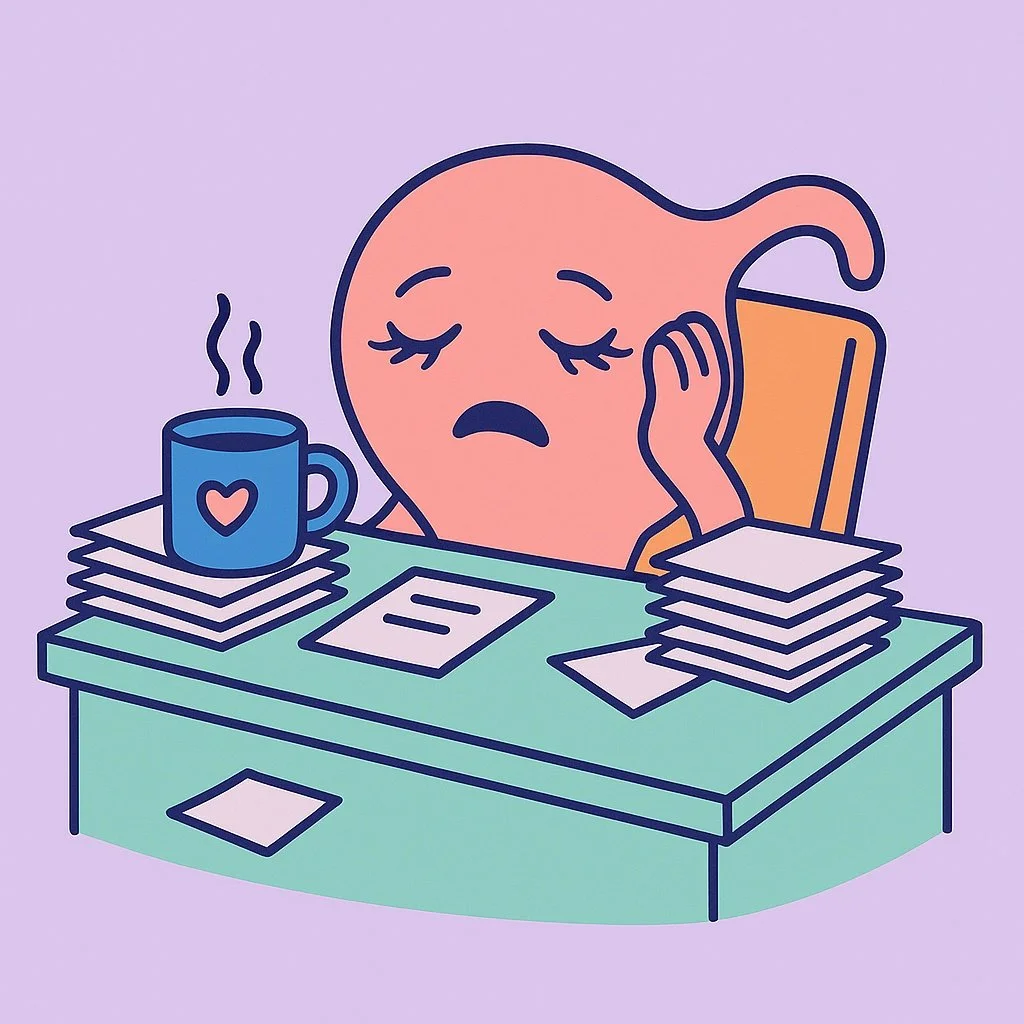PCOS: What It Is, What It’s Not, and What to Do About It
Polycystic Ovary Syndrome, or PCOS, sounds like one of those conditions you’re supposed to know about — but if you’re secretly fuzzy on the details, you’re not alone. Despite affecting up to 1 in 10 people with ovaries, PCOS is still misunderstood, misdiagnosed, and wildly oversimplified. (Spoiler alert: it’s not just about “cysts.”)
So let’s break it down — what it is, what it isn’t, and what your next steps should be if you suspect something’s up.
The Office Metaphor You Didn’t Know You Needed
Imagine your ovary as a hardworking employee in a decently functional office. Every month, your body gives it a manageable to-do list: grow a follicle, mature an egg, ovulate, done. When things run smoothly, the egg gets released and your period comes on time (or close enough).
Now imagine that same ovary working under a chaotic, overbearing boss — one who dumps dozens of tasks on its desk and expects all of them done right now. The ovary, overwhelmed, tries to do everything at once… and ends up doing nothing at all. No egg gets released. No ovulation. Just a pile-up of unfinished follicles that weren’t ready to go.
That’s PCOS: a hormonal breakdown in management that leaves your ovary overworked, under-supported, and unproductive. You could say she’s an ovary-achiever. She’s doing too much — and none of it effectively.
About Those “Cysts”
Here’s the thing: the “cysts” in PCOS aren’t actually cysts — they’re follicles, which are totally normal structures your ovary is supposed to make. In PCOS, there are just more of them than usual, stuck in development.
If anything, this condition should’ve been called Polyfollicular Ovary Syndrome — or better yet, Ovary-Achiever Syndrome. But alas, here we are.
Important note:
These follicles are not dangerous.
They do not need to be removed.
And they do not cause pain.
So Wait… What Is PCOS, Really?
PCOS is a hormonal condition that can affect your periods, fertility, skin, hair, and metabolism. To be diagnosed, most doctors use something called the Rotterdam Criteria, which says you need at least two of these three:
Irregular periods (or no periods)
Signs of high androgens (like acne, hair thinning, or hair growth in new places)
Polycystic-appearing ovaries on ultrasound
You do not need an ultrasound to be diagnosed. That said, many providers — ourselves included — often recommend one. Why? Because an ultrasound can still be helpful:
It can support the diagnosis if needed
It can rule out other causes of irregular periods (like fibroids or actual ovarian cysts — not the follicles we see in PCOS)
And it gives us a better picture of what your ovaries are up to (literally)
Think of it as a tool — not a requirement, but one that can give us more context and make sure we’re not missing something else important.
What PCOS Is Not
It’s not your fault. PCOS isn’t something you caused by eating carbs or being “lazy.” Hormonal imbalances aren’t a character flaw.
It’s not always visible. You can have PCOS with a regular weight, clear skin, and no obvious symptoms.
It’s not a painful condition. You can also have pelvic pain, but that deserves a separate workup. Don’t let someone dismiss your pain and blame it all on PCOS.
It’s not one-size-fits-all. Two people with PCOS might have completely different experiences.
What You Can Do About It
There’s no “cure” for PCOS — but it is manageable. And depending on your goals, there are different ways to treat it:
If your period’s gone rogue: Hormonal birth control can regulate your cycle and reduce acne or hair growth.
If you’re trying to get pregnant: Medications like letrozole or metformin can help trigger ovulation.
If your skin’s breaking out or hair’s thinning: Anti-androgen treatments (like spironolactone) may help.
If you’re just trying to feel like yourself again: Yes, lifestyle shifts can help — and not in a “clean eating” influencer way. Managing stress, balancing blood sugar, and supporting sleep can make a real difference.
While there’s no switch to flip, certain lifestyle changes can improve hormonal regulation — and in some cases, even restore ovulation or menstrual regularity.
Bottom Line
PCOS doesn’t define you, and it doesn’t mean your body is broken. You deserve real answers, not lazy advice or dismissive care.
So if your periods are weird, your ovary looks like it’s working overtime, or your doctor keeps brushing off your concerns — advocate for yourself.You’re not dramatic. You’re informed. And your ovary? She’s just a bit too ambitious. Honestly, same.
And maybe the most important thing? Find a provider you actually trust — someone who listens, doesn’t dismiss your concerns, and can help you figure out a plan that works for *you*. That way, you can spend less time stressing about PCOS and more time deciding if you actually like matcha or just the cup it comes in.

